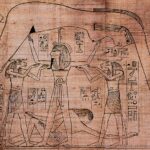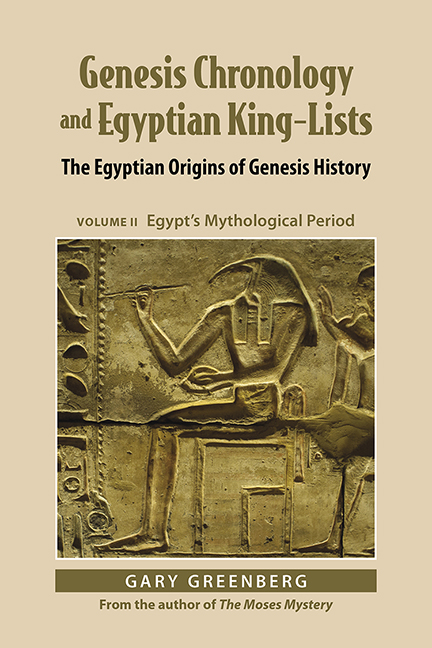FOR IMMEDIATE RELEASE
Contact: Gary Greenberg
info@biblemythhistory.com
The Book of Genesis is based on Egyptian myths and literature, says bible historian
Genesis Chronology and Egyptian King-Lists:
The Egyptian Origins of Genesis History, Volume II: Egypt’s Mythological Period
By Gary Greenberg
Renowned author Gary Greenberg returns with the second volume in his Egyptian Origins of Genesis History series. While Volume I focused on the historical chronology of Egypt, Genesis Chronology and Egyptian King-Lists: The Egyptian Origins of Genesis History, Volume II: Egypt’s Mythological Period (September 5, 2022) takes a look into the mythological side of Egyptian history. Looking at many of the bible’s most famous stories in the Book of Genesis, Greenberg’s thorough scholarly examination of the biblical and Egyptological sources presents clear and convincing evidence that the original authors of Genesis worked from a solid knowledge of Egypt’s literary and historical sources, using that as the basis of the Bible’s primeval history. His work challenges many current widely held beliefs that these stories originated in Babylonian literature.
Greenberg observes that despite the biblical narrative showing that Israel’s formative period as a nation took place in Egypt, almost all biblical scholars and Egyptologists refuse to take such claims seriously, rarely looking at anything more than an occasional peripheral link. Greenberg’s very detailed examination of the biblical and Egyptological sources tears through this “papyrus curtain” and shows how biblical scribes relied on Egypt’s rich trove of myth and literature about primeval history to formulate their own monotheistic take on Israel’s earliest roots. In the course of his study he looks at such well-known biblical stories such as the seven days of creation, Adam and Eve in the Garden of Eden, the conflict between Cain and Able, Noah and the flood, and the rise of nations from Noah’s descendants. All, he says, have very strong narrative connections to well-known Egyptian traditions.
Only after the Babylonians and Assyrians exercised military control over Israel, did the Genesis scribes lose touch with their Egyptian roots. This resulted in literary attempts to modify and transform the earlier stories so that they harmonized with the cultural traditions of their conquerors. Greenberg traces many of the literary trails that led from stories with Egyptian origins to new versions based on Babylonian era modifications.
Greenberg has appeared on numerous radio, television, and podcast shows to discuss his works and is a lively speaker and engaging debater. He is available for interviews, Q and A’s, articles, guest lectures, and debates.
Praise for Greenberg’s Previous Books on the Bible
“[Greenberg] seems to delight in a game of scholarly ‘gotcha.’ ” – N. Y. Times
“Fascinating and thought provoking.” – Today’s Librarian
“Guaranteed to raise hackles and lively debate.” – Denver Post
“Ingenious.” – St. Louis Post-Dispatch
“Intriguing and controversial.” – Multi-cultural Review
“A riveting read.” – Florence SC News
“A must read.” – The Tennessee Tribune
“Will make for lively dinner table discussions.” – Spokesman-Review
“Will make you think.” – Green Bay Press-Gazette
ABOUT THE AUTHOR
Gary Greenberg, former President of the Biblical Archaeology Society of New York, is the author of several books on biblical and Near Eastern history, including the biblical classics 101 Myths of the Bible and The Moses Mystery, as well as several peer-reviewed books about the Bible from academic presses. He is one of the world’s foremost authorities on the subject of Israel’s origins as an Egyptian people and its subsequent use of Egyptian history, literature and myth as the foundational source for its own origin stories. His books have been distributed worldwide in several non-English editions.
He has published articles in scholarly Egyptological journals and several essays on the academic web-site Bible and Interpretation He has also presented numerous papers at the annual conferences of several prestigious academic conferences, including the International Society of Biblical Literature, the International Congress of Egyptologists, the American Research Center in Egypt, and the American Society of Overseas Research. He served as a consultant to National Geographic Television’s documentary on Cain and Abel. He maintains a website at www.biblemythhistory.com.
Greenberg attended Brooklyn College, where he majored in Mathematics, and received a Juris Doctor degree from Seton Hall University School of Law.
Genesis Chronology and Egyptian King-Lists: The Egyptian Origins of Genesis History, Volume II: Egypt’s Mythological Period will be released September 5, 2022
REVIEW COPIES AVAILABLE UPON REQUEST
###



